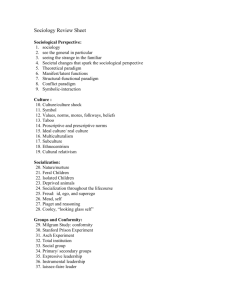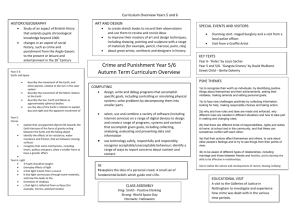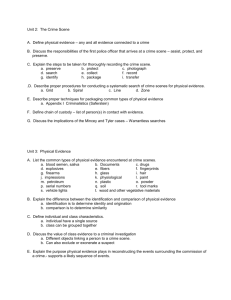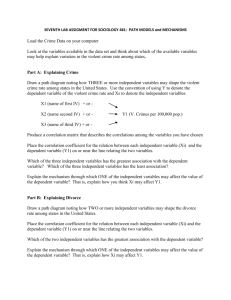Organized Crime
advertisement
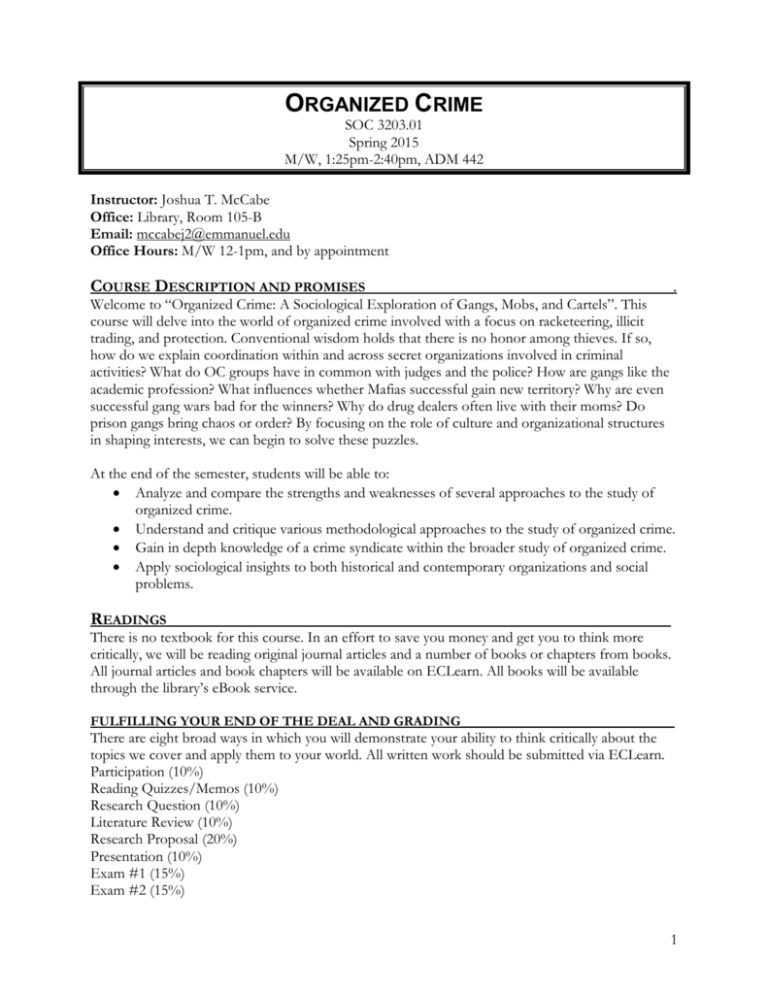
ORGANIZED CRIME SOC 3203.01 Spring 2015 M/W, 1:25pm-2:40pm, ADM 442 Instructor: Joshua T. McCabe Office: Library, Room 105-B Email: mccabej2@emmanuel.edu Office Hours: M/W 12-1pm, and by appointment COURSE DESCRIPTION AND PROMISES . Welcome to “Organized Crime: A Sociological Exploration of Gangs, Mobs, and Cartels”. This course will delve into the world of organized crime involved with a focus on racketeering, illicit trading, and protection. Conventional wisdom holds that there is no honor among thieves. If so, how do we explain coordination within and across secret organizations involved in criminal activities? What do OC groups have in common with judges and the police? How are gangs like the academic profession? What influences whether Mafias successful gain new territory? Why are even successful gang wars bad for the winners? Why do drug dealers often live with their moms? Do prison gangs bring chaos or order? By focusing on the role of culture and organizational structures in shaping interests, we can begin to solve these puzzles. At the end of the semester, students will be able to: • Analyze and compare the strengths and weaknesses of several approaches to the study of organized crime. • Understand and critique various methodological approaches to the study of organized crime. • Gain in depth knowledge of a crime syndicate within the broader study of organized crime. • Apply sociological insights to both historical and contemporary organizations and social problems. READINGS___________________________________________________________________ There is no textbook for this course. In an effort to save you money and get you to think more critically, we will be reading original journal articles and a number of books or chapters from books. All journal articles and book chapters will be available on ECLearn. All books will be available through the library’s eBook service. FULFILLING YOUR END OF THE DEAL AND GRADING_______________________________ There are eight broad ways in which you will demonstrate your ability to think critically about the topics we cover and apply them to your world. All written work should be submitted via ECLearn. Participation (10%) Reading Quizzes/Memos (10%) Research Question (10%) Literature Review (10%) Research Proposal (20%) Presentation (10%) Exam #1 (15%) Exam #2 (15%) 1 The first is Participation. In addition to active participation in class discussions, I would like you to attend at least one sociology-related event outside of the classroom. This can be on campus or across the city. I will announce relevant events throughout the semester and post them to ECLearn. After the event, make a 10-15 minute office hour appointment with me to tell me about it. If you went with other people, you can all sign up as a group. I rarely have time to attend these events so I love hearing about them from you. The event and visit must take place by Patriots Day. The second is a series of ten weekly Reading Quizzes/Memos. These “mini-quizzes” are based on the readings at the beginning of class each week. It will consist of two questions worth a ½ point each which should be easy to answer if you’ve done the reading. Students may opt to write up a two page (500+ words) memo as an alternative which must be uploaded to ECLearn before class each Monday. The third is a Research Question (1000+ words) on the topic of your choice related to organized crime in which you will use have to research datasets to setup a comparative analysis on some metric of your choice. You will have to justify why you chose that particular method of measurement. Is it a robust measurement? Why is the topic important? Why is this particular comparison interesting? You may work in in groups of up to three people. This is due on February 16th. The fourth is a Literature Review (2250+ words including revised research question) which builds off the first paper. You will discuss at least three theories and (their supporting evidence) for why your two cases are similar or differ from a comparative perspective. You may work in in groups of up to three people. This is due on March 16th. The fourth is a full Research Proposal (4000+ words including revised research question and literature review) building on the topic selected in the previous papers in which you will design a study with appropriate research methods and data to answer your original research question. You may work individually or in groups of up to three people. This is due on May 1st. The fifth is a Presentation of your research paper at the end of the semester where you will teach us about your project in a professional manner. I will talk more about the requirements later in the semester. Presentations will begin on April 15th and continue through the final exam period if necessary. The sixth and seventh are two in-class Exams consisting multiple choice, short answer, and essay questions for which you must demonstrate your understanding of basic sociological theories and concepts. More importantly, you should be able to apply them to topics and issues beyond those discussed in the readings. Please do not ask me about extra credit. Assignments are spread evenly throughout the course which gives you enough time to bring up your grade in subsequent assignments without the need for extra credit. The grading scale for the course is as follows: A 94-100% A- 90-93% B+ 87-89% B 83-86% B- 80-82% C+ 77-79% C 73-76% C- 70-72% D+ 67-69% D 63-66% D- 60-62% F Under 60% 2 OTHER CLASS POLICIES . Attendance Policy: Attending class is vital for the learning process. The majority of time spend in class will consist of discussions among students (not lectures by me) about the material you’ve read. Therefore, attendance is mandatory for this course. I take attendance at the beginning of each class and reserve the right to mark unexcused tardiness as an absence. Students with more than three unexcused absences at the end of the semester will be bumped down a full 1/3 letter grade for each absence after the first three. For example, a B+ student with 4 unexcused absences would be bumped down to a B, with 5 unexcused absences to a B-, and with 6 unexcused absences to a C+. Missed assignments: Students may make up assignments or exams only with documentation of a legitimate excuse for missing the assignment or exam, such as serious illness or death in the family. Academic integrity: Emmanuel College is an educational community committed to academic integrity, ethics and trust. All members of this community share in the responsibility for building and sustaining a culture of high academic standards. Cheating and plagiarism are very serious offenses and have severe consequences. The college’s definitions for cheating and plagiarism are specifically outlined in the Academic Integrity Policy found in your Student Handbook and on our website at http://www.emmanuel.edu/academics/academic_resources/academic_integrity_policy.html. Incidents of cheating and plagiarism will result in the following: (a) failure of the assignment or test, (b) notification of your Academic Advisor, and (c) notification of the Academic Dean. If I deem the offense serious enough, I may also fail you for the entire course. Cheating and plagiarism not only hurt your own learning experience, but they are also disrespectful to your fellow classmates who did complete their own work. Cellphones/Laptops: Cellphone use is not permitted during class – this includes texting! It is distracting to me as well as many of your fellow students. Please make sure you turn the ringer off before you come to class. Students are welcome to use laptops/iPads during class if they are used for taking notes and other activities related to the class – this does not include facebook! If I catch you using your laptop for non-class related reasons, you will be banned from using it in my class for the rest of the semester. Office Hours: Students are encouraged to visit me during office hours for any reason at all. I am not always quick to respond to emails so this is the best way to get the help you may need. Students are also encouraged to visit me during office hours simply to discuss interesting things that they may have read in class or elsewhere. Credit Hour Statement: Students are expected to devote a minimum 12 hours of study for each 4credit course per week over the course of a traditional semester. A minimum of three of these hours are spent in class. (An hour may be defined as 50 minutes for the purposes of this definition.) Consequently, faculty is expected to assign out-of-class work that will require a typical student to spend a minimum of an additional nine hours of effort per week on average outside of class. 3 PART I – ORIGINS OF ORGANIZED CRIME Week 1 Introduction (1/14) No required readings. We will go over the syllabus, my expectations of you as students, and your expectations of me as an instructor. Week 2 What is Organized Crime? (1/21) Maltz, M.D. (1976). “On Defining ‘Organized Crime’: The Development of a Definition and a Typology,” Crime and Delinquency 22: 338-346. Hagan, F.E. (1983) “The Organized Crime Continuum: A Further Specification of a New Conceptual Model,” Criminal Justice Review 8: 52-57. Varese, F. (2010). “What is Organized Crime? Introduction” in F. Varese (ed.), Organized Crime (London: Routledge), pp. 1-35. Memo/Quiz on Wednesday, January 21st. Week 3 Organized Crime and the State (1/26, 1/28) Skaperdas, S. (2001) The Political Economy of Organized Crime: Providing Protection When the State Does Not,” Economics of Governance 2(3): 173-202. Sung, H.E. (2004). “State Failure, Economic Failure, and Predatory Organized Crime: A Comparative Analysis,” Journal of Research in Crime and Delinquency 41: 111129. Meet in library on Wednesday, January 28th for session with research specialists. Memo/Quiz on Monday, January 26th. Week 4 Mafias on the Move (2/2, 2/4) Varese, F. (2011). Mafias on the Move: How Organized Crime Conquers New Territories. [available as eBook from library] Memo/Quiz for Chapters 1-3, 5, and 7 on Monday, February 2nd. Week 5 Origins of Street Gangs (2/9, 2/11) Venkatesh, Sudhir (1997). “The Social Organization of Street Gang Activity in an Urban Ghetto,” American Journal of Sociology 103 (1): 82-111. Memo/Quiz on Monday, February 9th. Exam #1 on Wednesday, February 11th. 4 PART II – THE BUSINESS OF ORGANIZED CRIME Week 6 Individual meetings (2/18) No formal class on February 18th but you must make an appointment for a meeting with me during the day to discuss your Research Question. Research Question due on Monday, February 16th at 8am. Week 7 Protection, Extortion, and Illicit Trade (2/23, 2/25) Paul, Chris and Al Wilhite (1994). “Illegal Markets and the Social Costs of RentSeeking,” Public Choice 79(1/2): 105-115. Snyder, Richard and Angelica Duran-Martinez (2009). “Does Illegality Breed Violence Drug Trafficking and State-Sponsored Protection Rackets,” Crime, Law & Social Change 52: 253-273. Levitt, Steven D. and Sudhir Venkatesh (2000). “An Economic Analysis Of A DrugSelling Gang’s Finances,” The Quarterly Journal of Economics 115(3): 755-789. Quiz on Monday, February 23rd. Week 8 The Role of Culture and Ethnicity (3/2, 3/4) Light, Ivan (1977). “The Ethnic Vice Industry, 1880–1944,” American Sociological Review 42(3): 464-479. Steffensmeier, Darrell and Jeffery T. Ulmer (2006). “Black and White Control of Numbers Gambling: A Cultural Assets-Social Capital View,” American Sociological Review 71(1): 123-156. Lee, Jennifer (2006). “Comment on Steffensmeier and Ulmer, ASR, February 2006: Cultural Assets or Structural Advantages in Numbers Gambling?,” American Sociological Review 71(1): 157-161. Ulmer, Jeffery T. and Darrell Steffensmeier (2006). “Reply to Lee, ASR, February 2006: Is There No Place for Culture in a Sociology of Legal and Illegal Enterprise?,” American Sociological Review 71(1): 162-166. Memo/Quiz on Monday, March 2nd. Week 9 Spring Break (No classes held this week) Work on your papers (and have a little fun if you have time). 5 Week 10/11 Prison Gangs (3/16, 3/18, 3/23, 3/25) Skarbek, D. (2014) The Social Order of the Underworld: How Prison Gangs Govern the American Penal System. Oxford University Press. [available as eBook from library] No formal class on March 25th but you must make an appointment for a meeting with me during the day to discuss your Research Question. Memo/Quiz for Ch. 1-4 on Monday March 16th. Literature Review due on March 16th. Memo/Quiz for Ch. 5-6 on Monday, March 23rd. PART III – NEW DIRECTIONS IN ORGANIZED CRIME Week 12 Underworld Communication (3/30, 4/1) Gambetta, D. (2009). “Introduction,” in Codes of the Underworld. Princeton: Princeton University Press. Memo/Quiz on Monday, March 30th. Exam #2 on Wednesday, April 1st. Week 13/14 Fighting Organized Crime / Presentations (4/8, 4/13, 4/15) Miron, Jeffrey A. and Jeffrey Zwiebel (1995). “The Economic Case Against Drug Prohibition,” The Journal of Economic Perspectives 9(4): 175-192. Milhaupt, Curtis J. and Mark D. West (2000). “The Dark Side of Private Ordering: An Institutional and Empirical Analysis of Organized Crime,” University of Chicago Law Review 67(1): 41-98. Documentary on Wednesday, April 8th: “The House We Live In” Quiz on Monday, April 13th. Week 15/16 Presentations (cont’d) (4/22, 4/27) Presentations continue through end of semester. Research Proposal due on May 1st at 8am. 6


